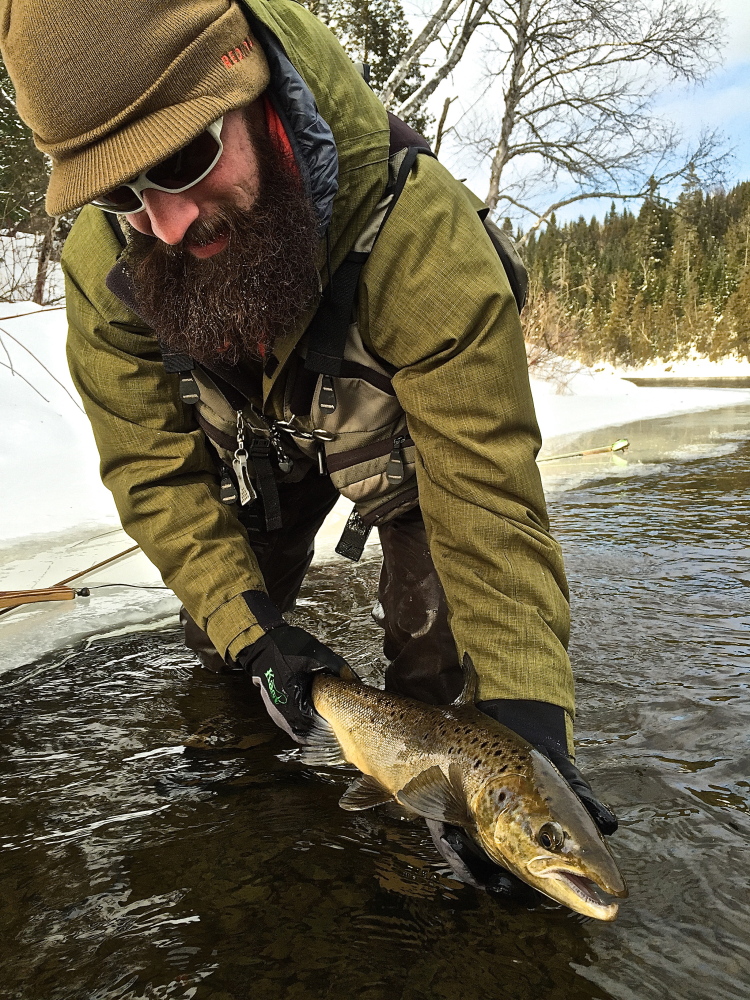Despite this winter’s seemingly relentless grip, there are those who simply refuse to succumb.
While many anglers embrace the seasonal change and look forward to ice fishing, there are some who go to great lengths in order to fish open water.
“The last weekend of September, it’s a sad time for us with many waters closing for the season,” said Ben Rioux of Fort Kent, an avid angler and online sales manager for Quigley’s Building Supply and Quigley Outdoors.
“When the department (IFW) opened up the Fish River for open water fishing last January, we started batting around the idea of winter fishing.”
Since then, Ben and friend Chris Bard, also of Fort Kent, have been fishing the Fish River through the winter, dodging ice flows, wading in 34-degree water and catching landlocked salmon.
It didn’t start that way. Fishing started slow until they solved the river.
“There is a lot of trial and error. We read a lot of different articles and blogs about fishing in the winter in Montana, and fishing for steelhead,” said Rioux. “But once we figured it out, we started catching fish.”
One of the keys is fishing the slower water. A fish’s metabolism slows down drastically this time of year, and it seeks out deeper, slower water. Couch water, Rioux likes to call it.
“You have to target the slower water, the easy resting places for fish like the tail of the pool and some of the deeper water – the couch water. During the winter you sit on the couch a lot – that’s why it’s called couch water,” said Rioux.
And, of course, you deal with the cold. And the snow. And ice.
“After landing a fish, I put my rod on the ice, and when I picked it up, the reel was frozen solid,” said Rioux. A quick trip to the car, crank up the heater with the rod in front of the vent, and you’re ready to go again.
Your reel isn’t the only piece of equipment that ices up. Ice clings to the line, it forms in the eyelets. You have to be careful removing it, as you can break a tip or a guide. Or even break your fly line.
When casting, the cold creates challenges.
“You can make the perfect cast, and there’s a 50-50 chance of it landing on slush or ice, and you have to pull it through to get it to sink,” said Rioux.
“You need to time your cast and watch out for stuff coming down the river,” said Rioux, who keeps an eye upriver for sheets of ice that break off and silently slide downriver.
And while timing your cast between icebergs, you must get your fly right on the fish since they barely move in order to eat.
“You have to drift it right in front of them to strike. A big meaty meal is what does it,” says Rioux, who uses big leech patterns and big woolly buggers at the end of a heavy deep sink-tip line.
While Rioux fishes the Fish River in Aroostook County, there are some flowing winter waters where you can target trout now. Popular spots include the upper Androscoggin, the lower section of the Mousam and the Presumpscot.
But prepare for the cold. You need decent waders and lots of layers. Gloves obviously are extremely important. Rioux recommends Kastgear.com, a western company that specializes in technical cold weather gear designed for this type of fishing.
And a good pair of polarized glasses are a must. While you won’t see the fish, you get a clearer picture of just how much larger those ice floes are under the water, and you can see the rocks before you stumble on one.
Fish with a friend and don’t push the limits. Rioux fishes this section of the river because he knows it well.
“When you slide your butt across the ice and drop into the water, you want to know where bottom is,” said Rioux.
And of course it takes a special type of angler to revel in these conditions.
“You need to be a little sick in the head. There are moments when it really isn’t fun,” said Rioux. “We’re obsessed.”
“But then you hook into a fish and you forget that you’re cold,” said Rioux, “and there’s never a more peaceful time on the river than the middle of January.”
Mark Latti is a registered Maine guide and the landowner relations/recreational access coordinator for the Department of Inland Fisheries and Wildlife.
Send questions/comments to the editors.



Comments are no longer available on this story